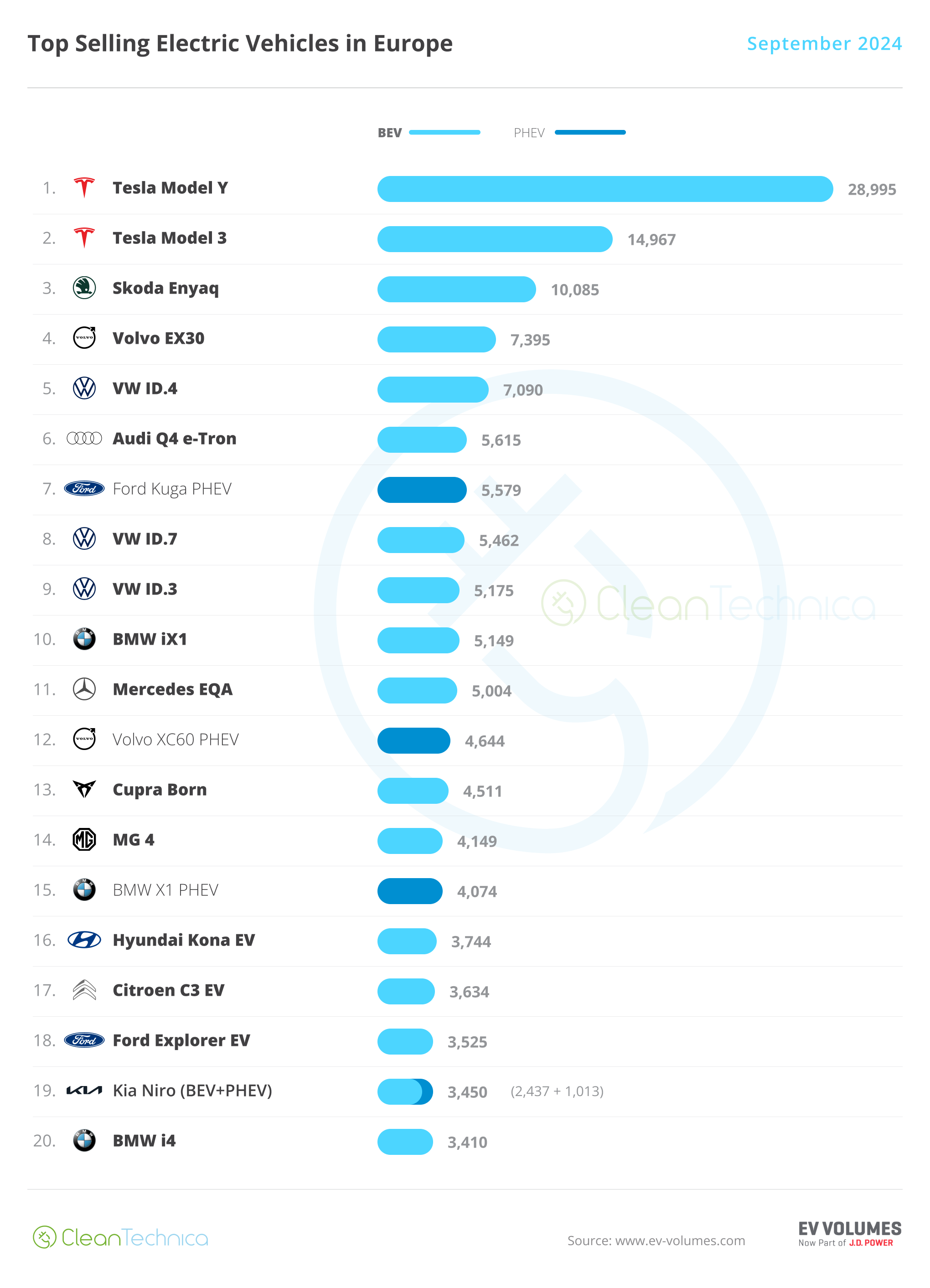Sign up for daily news updates from CleanTechnica on email. Or follow us on Google News!
According to statistics from the European Automobile Manufacturers’ Association, a total of 1,538,621 battery electric cars were registered in the EU last year. Compared to the 1,123,444 battery electric cars sold in 2022, this represents an increase of 37 per cent. There were also 813,480 newly registered plug-in hybrids, which is seven percent fewer than in the previous year when 874,777 PHEV vehicles were sold .
Total new car sales in the EU increased by 13.9% last year compared to 2022. There were 10.5 million new vehicles registered on the EU in 2023 according to the ACEA. All EU markets recorded more registered cars, with the exception of Hungary (-3.4 per cent). Italy (+18.9 per cent), Spain (+16.7 per cent) and France (+16.1 per cent) recorded the biggest increases.
Electric Cars Outsell Diesels
Breaking sales down by types of powertrain, conventional cars with gasoline engines accounted for 35.3 percent of new registrations. Conventional hybrids were 17.1 percent of the new car market followed by electric cars at 14.6 percent. Diesel deliveries came in at 13.6 percent while deliveries of plug-in hybrids totaled 7.7 percent. According to Dataforce 2023, the most successful model in Europe across all drive types was the Tesla Model Y with 254,822 units sold, ahead of the combustion models Dacia Sandero (235,893) and VW T-Roc (206,438).
Growth in the EU market for electric cars was driven by countries such as Belgium — 93,285 new registrations for an increase of 148 percent, Denmark — 62,759, up 104 percent, and Portugal — 36,390, up 102 percent. In total, the following companies were responsible for the most sales of electric cars:
- Germany — 524,219
- France — 298,219
- Netherlands — 113,981
- Sweden — 112,208
Countries outside the EU also saw significant sales of electric cars:
- Norway –104,587
- UK — 314,684
The ACEA also publishes a manufacturer ranking, but does not differentiate between different drive types in terms of sales. Volkswagen Group sold 2,753,053 units across all drive systems in the EU in 2023, an increase of 18% compared to 2022 and a market share of 26%. As a pure electric car manufacturer, Tesla’s figures alone are meaningful. It recorded 279,042 electric cars registered in the EU in 2023 compared to 147,457 last year — an 89.2 per cent increase.
The Demise Of Diesel
There was a time after the OPEC oil embargoes in the 1970s when governments all across Europe and the UK strongly encourage the sale of diesel powered cars. Diesel engines are more efficient than gasoline engines. Since crude oil was in short supply and expensive, it made sense to go with the technology that squeezed as many kilometers out of a gallon of fuel as possible. Taxes on diesel fuel were set well below gasoline to encourage drivers to buy diesel powered cars and that’s exactly what happened.
If you visited Europe twenty years ago, the streets of every village, town, and city were punctuated by the clatter of diesel engines. Most cars had manual transmissions to squeeze an extra few tenths of a kilometer out of each gallon. Inexpensive cars from Vauxhall and Renault had diesel engines as did big luxury cars from Mercedes, BMW, and Audi.
But as we all know, even though diesel engines are efficient, they also tend to spew noxious stuff from their tailpipes, things like oxides of nitrogen and sulfur in far higher quantities than from the tailpipes of gasoline powered cars. Over decades, the medical evidence identifying diesel emissions as hazardous to human health got stronger every year.
The mania for diesel engines sparked a push from the most senior levels of management at Volkswagen to promote them vigorously in the company’s marketing efforts. Volkswagen created a “Clean Diesel” campaign that suggested the company had found a way to make diesel engines emit fewer emissions.
When there was pushback from scientists, the company hired an obscure laboratory in the US to place monkeys in glass boxes where they were forced to breathe the exhaust fumes for an old Ford F-250 diesel, ostensibly to prove that breathing diesel exhaust might actually be a good thing to do or at least would do no harm. Volkswagen also came up with some brilliant advertising that focused on the fuel economy of diesel cars.
The most famous one shows two young men starting a journey in a Volkswagen Passat diesel. The only cassette tape in the car was a Learn To Speak Spanish tutorial. By the time they need to stop to refuel, they are both fluent in Spanish. It’s brilliant and for a while it worked, until the fall of 2015 when the Volkswagen diesel cheating scandal broke.
Just as diesel sales plummeted, Tesla was introducing the world to competitive electric cars that were more than glorified gold carts. The rest, as they say, is history. (Plenty of other automakers got caught cooking the books when it came to reporting their diesel emissions as well.) Today, not quite ten years after the diesel cheating scandal started, electric cars are outselling diesel cars in Europe. That is really remarkable.
Have a tip for CleanTechnica? Want to advertise? Want to suggest a guest for our CleanTech Talk podcast? Contact us here.
Our Latest EVObsession Video
I don’t like paywalls. You don’t like paywalls. Who likes paywalls? Here at CleanTechnica, we implemented a limited paywall for a while, but it always felt wrong — and it was always tough to decide what we should put behind there. In theory, your most exclusive and best content goes behind a paywall. But then fewer people read it!! So, we’ve decided to completely nix paywalls here at CleanTechnica. But…
Thank you!
CleanTechnica uses affiliate links. See our policy here.




